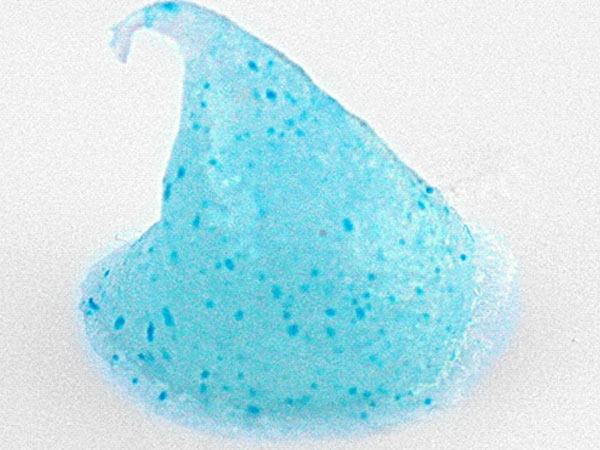Did you know that polyethylene is the most common plastic in the world? It is used primarily for containers and packaging, such as these bottles and plastic grocery bags, and has been a concern for the environment because polyethylene lasts practically forever and is NOT biodegradable.
Do you see those blue specks in the above toothpaste, showing the suggested pea-sized amount that you should use when you brush your teeth? That’s plastic. Yes, there is plastic in Crest Toothpaste!
Not that I’m counting the bits but that seriously looks like A LOT of plastic… err…high density polyethylene. That’s what plastic trash cans are made from! We’re not talking about polyethylene glycol, which is soluble in water. This stuff won’t dissolve in water, or even acetone or alcohol for that matter. How do I know it won’t dissolve? People have tested it. It has been established that polyethylene will not dissolve in the mouth, or even in household products. In fact, despite all of the testing, it does not change at all.
The scary truth is that I’m seeing these same bits of blue plastic stuck in my patient’s mouths almost every day.
Around our teeth we have these little channels in our gums, sort of like the cuticles around our fingernails. The gum channel is called a sulcus, and it’s where diseases like gingivitis get their start. A healthy sulcus is no deeper than about 3 millimeters, so when you have hundreds of pieces of plastic being scrubbed into your gums each day that are even smaller than a millimeter, many of them are getting trapped down there. The thing about a sulcus is that it’s vulnerable. Your dental hygienist spends most of his or her time cleaning every sulcus in your mouth, because if the band of tissue around your tooth isn’t healthy, then you’re not healthy. With this knowledge, you can probably start to see why having bits of plastic in your sulcus may be a real problem, sort of like when popcorn hulls find their way into these same areas. Ouch, right?
Like I said, I’ve been seeing these blue particles flush out of patients’ gums for several months now, and so has the co-hygienist in our office. So have many dental hygienists throughout the United States and Canada who have consulted with each other and realized that we have a major concern on our hands.I am not saying that polyethylene is causing gum problems. I’d be jumping too soon to that conclusion without scientific proof. But what I am saying definitively is that plastic is in your toothpaste, and that some of it is left behind even after you’re finished brushing with it.
Do you want plastic in your toothpaste? So far the only mention of polyethylene on the Crest website is that it is added to your paste for color, not as an aid in helping to clean your teeth or to disperse important anti-plaque or anti-cavity ingredients. In other words, according to Crest, “Polyethylene plastic is in your toothpaste for decorative purposes only.” This is unacceptable not only to me, but to many, many hygienists nationwide. We are informing our patients, doing research separately, and comparing notes between offices to keep track of this growing situation. As it stands, until Procter & Gamble gives us a better reason as to why there is plastic in your toothpaste, we here at Cascades Center for Dental Health have stopped handing out samples to our patient and are switching over to Colgate products.
Here are some of the brands that we currently are aware of which contain polyethylene:
- Crest 3D White Radiant Mint
- Crest Pro-Health For Me
- Crest 3D White Arctic Fresh
- Crest 3D White Enamel Renewal
- Crest 3D White Luxe Glamorous White
- Crest Sensitivity Treatment and Protection
- Crest Complete Multi-Benefit Whitening Plus Deep Clean
- Crest 3D White Luxe Lustrous Shine
- Crest Extra White Plus Scope Outlast
- Crest SensiRelief Maximum Strength Whitening HYPERLINK “http://www.dentalbuzz.com/wp-content/uploads/2014/04/sensirelief2.jpg”Plus Scope
- Crest Pro-Health Sensitive + Enamel Shield
- Crest Pro-Health Clinical Gum Protection
- Crest Pro-Health For Life for ages 50+
- Crest Complete Multi-Benefit Extra White+ Crystal Clean Anti-Bac
- Crest Be Adventurous Mint Chocolate Trek
- Crest Be Dynamic Lime Spearmint Zest
- Crest Be Inspired Vanilla Mint Spark
- Crest Pro-Health Healthy Fresh
- Crest Pro-Health Smooth Mint
Recently, Crest has announced it will remove tiny plastic micro-beads from its toothpaste because of pressure from consumers.” The micro-beads made of polyethylene are considered “safe” and the U.S. Food and Drug Administration approves their use as a food additive, but the company says in a blog post it understands there is a growing preference for us to remove this ingredient. So we will.”… in 2016.
Please ask your hygienist if you have an issue in your mouth and if you should switch the tooth paste you are currently using.


